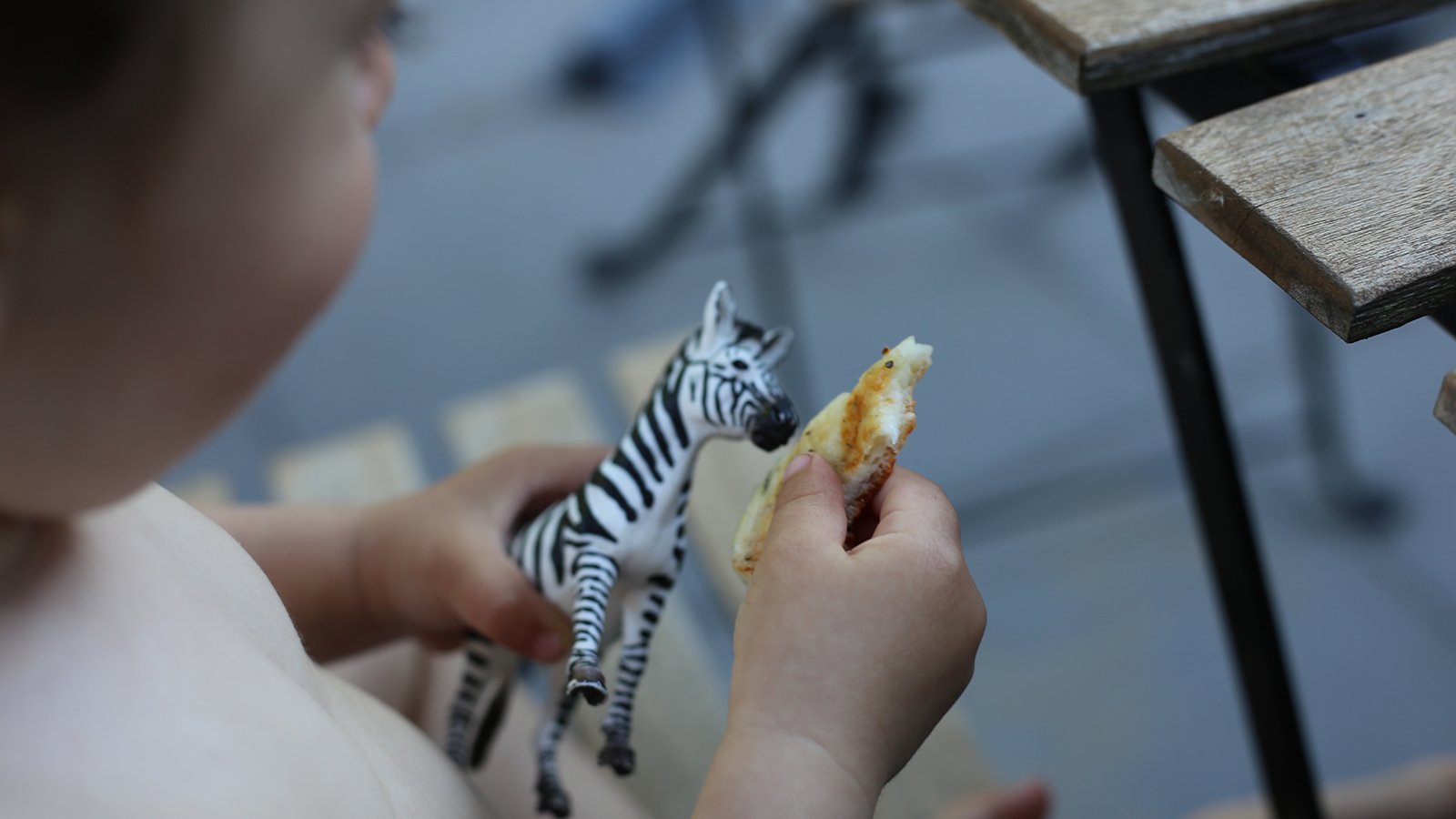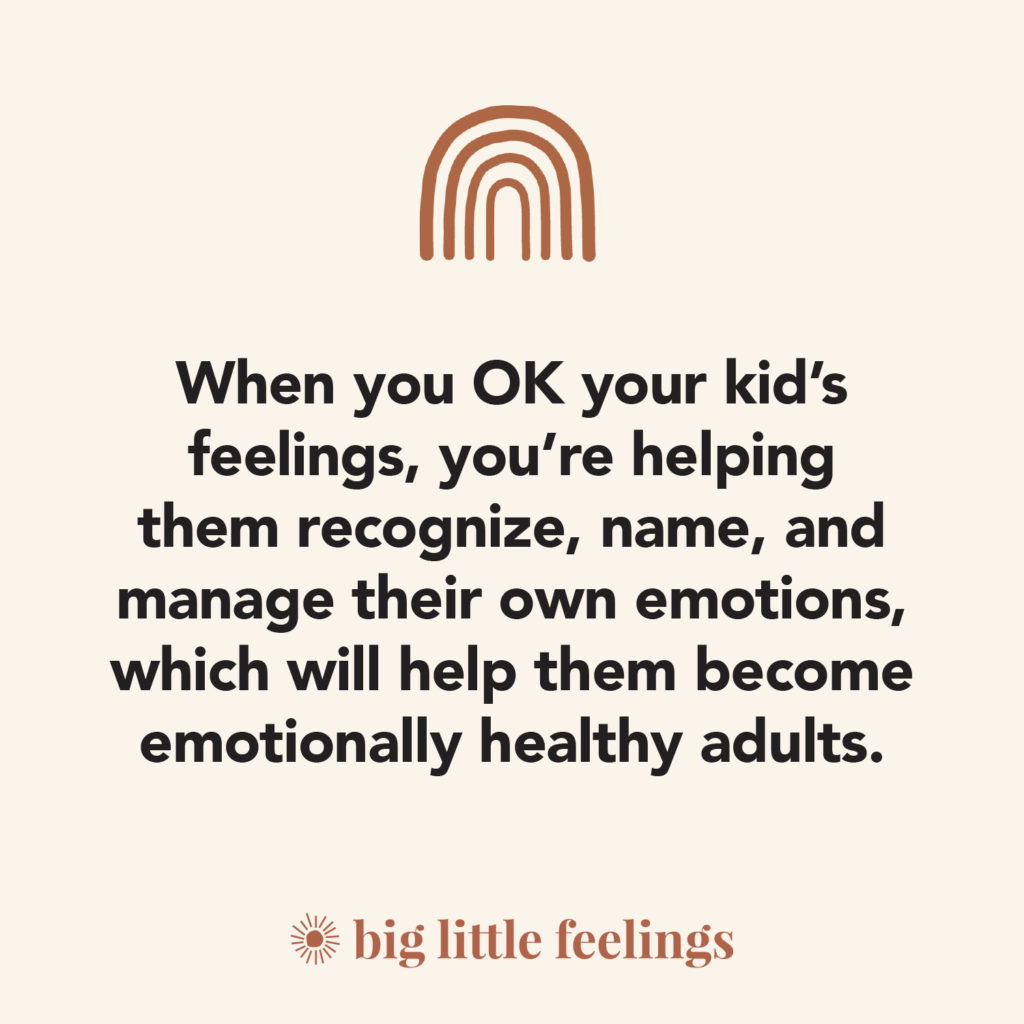

Why Naming and Accepting Your Toddler’s Big Feelings Is Important
And What to Do If Talking About Feelings Weirds You Out
If you’re like most parents we talk to, you found our website or Instagram when you went searching for help managing your toddler’s meltdowns.
In addition to offering step-by-step guidance to help you tame those tantrums, you’ll notice we spend a LOT of time talking about FEELINGS.
We suggest you say things like:
- You’re frustrated because I won’t let you eat the dog food. It’s okay to feel frustrated.
- You’re sad because we can’t go see grandma. It’s okay to feel sad.
- You’re jealous because your goldfish gets to swim all day. (WTF and) it’s okay to feel jealous.
So here’s a heads up: If you haven’t already, you may, at some point, find yourself thinking: “Seriously guys, what is up with you and the feelings? I just want to fix my toddler’s behavior. All this FEELINGS stuff seems a little weirdsies and woo woo.”
We hear you. Many people (including the two of us) were raised in a home where certain feelings were “good” (happy), others were “bad” (mad, sad) and, in general, there was just no good reason to talk about any of them.
So it makes complete sense that this style of parenting would have you feeling a little like, “Uh, this is some seriously new-age crapola.”
Stick With Us Though, ‘Cause Here’s the Truth
Acknowledging and accepting your toddler’s feelings is the first and most critical step toward decreasing the intensity and duration of tantrums.
Yeah, let that soak in for a sec. Okaying the feelings helps reduce tantrums. We know: WHOA.
Showing your toddler you hear, see, and understand them is the water hose extinguishing the burning embers of a meltdown. Over time, thanks to your help, your toddler will learn to name and cope with their own emotions. That means less internal chaos for them—and we’re not just talking about while they’re smol!
By simply naming and acknowledging their feelings, you help your kid take one more step toward becoming an emotionally healthy, resilient adult. You know, the kind of human other humans love to be around. The kind of human who can handle tough stuff with grace and wisdom. The kind of human our world super needs right now! Feelings FTW!
But you don’t have to take our word for it! Research shows affirming kids’ feelings makes them psychologically strong and emotionally resilient. So this “feelings stuff” isn’t our opinion; it’s science! (And we’re not gonna argue with science.)
Doesn’t Focusing on Feelings Promote Bad Behavior?
Nope! Because remember, you’re okaying the feeling—not the behavior. No matter how ridiculous or irrational (oh man, SO irrational) they may be, your kiddo gets to have their feelings and you get to hold firm boundaries.
Here’s what it looks like:
- You’re mad because baby sister took your toy. It’s okay to feel mad. It’s not okay to hurt someone. I’m moving baby sister over here to keep her safe.
- You’re nervous to go to school today. It’s okay to feel nervous. It’s not okay to throw your backpack. I’ll carry your backpack to the car now.
All right, so you’re still reading this post (high-five and thank you), which means you’re here for some practical tips. Spoiler alert: You’re gonna get even more comfortable expressing feelings on the daily.
The Daily Feelings Check-In
While okaying the feelings during a tantrum is important, never underestimate the value of what you do during the calmer moments. What you teach outside of a tantrum is just as important as your actions in the middle of one.
Our Daily Feelings Check-In will help you work through any personal weirdsies you have when it comes to talking about feelings. Plus, it’s the perfect way to help grow the emotional health of your toddler.
The check-in is simple. During a calmish moment—like bedtime or another winding-down time— ask your toddler three questions:
- What did you feel happy about today?
- What did you feel sad about today?
- What are you looking forward to tomorrow (or after quiet time)?.
Keep it short and light—because hello, short attention span.
This may be tricky and awkward at first, but over time your home will be a safe space where emotions can be felt and shared. And your toddler will gain the ability to verbalize and cope in healthy ways with their big feelings.
And to be clear, you can ABSOLUTELY have these conversations even before your child’s language skills are fully there, starting at about two years old. You can even help those younger toddlers out: “Hmmm when sister took your toy earlier, you felt sad. It’s okay to feel sad.” Those preverbal toddlers understand more than you know!
Can you imagine what it might be like for your toddler to say, “I’m feeling so MAD!!!!” instead of turning into the Tazmanian devil? AMAZING, right? It’s entirely possible, friend.
Your Feelings Matter, Too
Our online course isn’t just focused on your toddler’s well-being; it’s about yours, too. We believe in grace-filled parenting without shame, guilt, and unrealistic expectations. In Winning the Toddler stage, you’ll find simple, practical, caring tools to help you become the parent you want to be.
You can be the cool, calm, confident leader of your home! Check out Winning the Toddler Stage.

